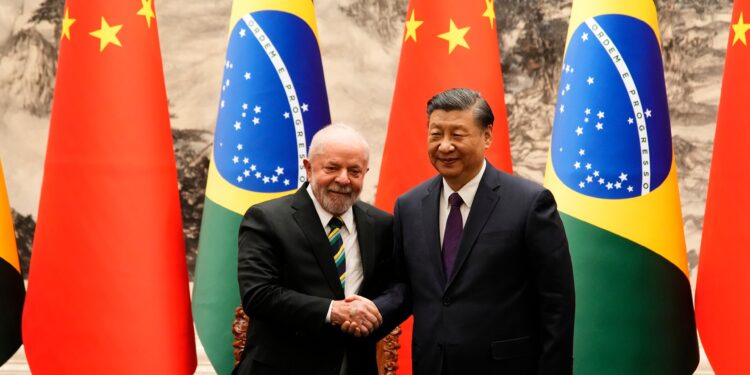Stratfor said in a recent report that Brazil is preparing to join China’s Belt and Road Initiative, despite a significant decline in Chinese investment in the country recently.
This decision comes amid efforts to enhance cooperation between the two countries, and it is expected that Chinese President Xi Jinping will officially announce this accession during his scheduled visit to Rio de Janeiro next November.
Although Chinese investment in Brazil fell to $1.73 billion in 2023, the second lowest level since 2009, the number of Chinese projects in Brazil remained high.
According to Stratfor, China is also among the top 10 countries investing in Brazil worldwide.
The report indicates that trade exchanges between Brasilia and Beijing continue to flourish, as China is the largest buyer of Brazilian agricultural products, including 73.1% of soybean exports, 60.4% of Brazilian meat sales, and 29% of genetically modified corn in 2023.
Positive effects on Brazil
According to the platform, Brazil’s accession to the Belt and Road Initiative is expected to bring many economic benefits, including:
- Quick access to larger funding: By joining the initiative, Brazil will gain access to greater Chinese financing and large infrastructure projects, which will help diversify Chinese investments in its economy.
- Promoting investments in various sectors: Accession could help increase Chinese investment in sectors such as electric vehicle manufacturing, renewable energy, and oil and gas, as well as build key infrastructure projects linking Brazil’s producing regions to international markets, particularly Brazil’s central-western regions to the Pacific coast.
- Realizing President Lula da Silva’s ambitions: Additional Chinese investment could contribute to Brazilian President Lula da Silva’s goal of promoting regional integration by building roads and railways across South America, especially linking Brazil to the Andean countries.
Washington in the balance
Despite the economic benefits, Brazil’s joining the Belt and Road Initiative could affect its relations with the United States, an important strategic partner for Brazil, Stratfor said.
The decision represents a diplomatic challenge for President Lula, as it could strain relations with Washington, especially since the United States is Brazil’s main partner in the defense sector and has supported the country’s democratic institutions during recent political crises.
However, as the report points out, the US position on this accession depends largely on the results of the upcoming US presidential elections in November, as follows:
- If Donald Trump wins: Brazil is likely to join the Belt and Road Initiative immediately, given the expectation that US-Brazil cooperation will decline amid the political rift between Lula and Trump.
- If Kamala Harris wins: Brazil may delay its decision to join to avoid damaging relations with the new US administration, but it is likely that Brazil will eventually join the initiative because of the economic and strategic benefits it offers.
US concerns
Stratfor expects the US to oppose the move, warning Brazilian diplomats and officials of potential risks related to intellectual property, debt sustainability, and over-reliance on China.
But the report notes that Washington is unlikely to impose punitive measures on Brazil, as this could damage bilateral relations with a key partner in the region and lose its influence over investments and partnerships in sensitive sectors in Brazil, such as telecommunications and defense.



